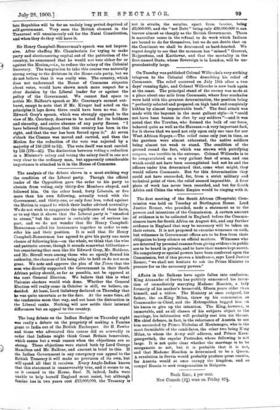The analysis of the debate shows in a most striking
way the condition of the Liberal party. Though the official leader of the Opposition gave the order to his party to abstain from voting, only thirty-five Members obeyed, and followed him. On the other hand, forty Liberals, or five more than his own following, actually voted with the Government, and thirty-one, or only four less, voted against the Motion in regard to which their leader advised neutrality. We do not wish to exaggerate the significance of these facts, or to say that it shows that the Liberal party is "smashed to atoms," but the matter is certainly one of serious im- port, and we do not wonder that Sir Henry Campbell. Bannerman called his lieutenants together in order to con- sider his and their position. It is said that Sir Henry Campbell-Bannerman has agreed to give his party one more chance of following him—on the whole, we think that the wise and patriotic course, though it sounds somewhat Gilbertian- but considering that men like Sir Edward Grey, Mr. Haldane, and Mr. Birrell were among those who so openly flouted his authority, the chances of his being able to hold on do not seem great. We note and approve the plea of the Times that the men who directly supported the Government in their South African policy should, as far as possible, not be opposed at the next General Election. We believe that this is what Unionist electors would wish done. Whether the General Election will really come in October is still, we believe, un- decided. At least, Lord Salisbury declared on Thursday that he was quite uncertain as to the date. At the same time, all the tendencies seem that way, and not least the distraction in the Liberal ranks. Nothing will now settle their internal differences but an appeal to the country.


































 Previous page
Previous page